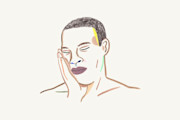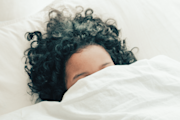I open my eyes to a still-dark sky.
It’s 3 a.m. I’m awake again at what I call “early o’clock” in the morning.
I catch the time on the clock and do a double-take.
It’s 3 a.m. I’m awake again at what I call “early o’clock” in the morning.
Why does this keep happening?
“Is it the state of the world, or is it something else?” I find myself wondering.
Why does this keep happening?
In order to solve this frustrating ongoing situation, I spoke with neurologist and friendly neighborhood sleep scientist Dr. Allison Brager, Ph.D., to help unravel the mystery behind this curious quandary.
So, why do I keep waking up at the same time every night?
As with many mysteries in life, there are a number of simple explanations as to why we wake up at these seemingly odd hours of the night, as well as some more complicated reasons.
Some factors that can heavily impact our sleep are (somewhat) within our control to change or adjust, such as blue light in the room from tech devices or a sudden change in room temperature.
The most frequent reason we wake up in the middle of the night is due to our body temperature changing.
However, there are also factors that may be completely beyond our ability to control that can wake us up in the middle of the night, including internal body temperature changes, as well as transitions between different sleep cycles, such as moving from deep sleep to REM sleep.
Body temperature changes can wake us up in the early morning
According to Dr. Brager, the most frequent reason we wake up in the middle of the night is due to our body temperature changing.
This is consistent with research, showing non-rapid eye movement (NREM) sleep episodes are accompanied by core body and brain cooling.
Our core body temperature is the lowest around 2 a.m., 3 a.m., or 4 a.m.
While REM sleep, aka rapid eye movement sleep—is not the only stage of sleep where we have dreams—it's the stage of sleep where we are most likely to remember our dreams.
As research shows, when there's a disruption in our core body temperature, then the brain's natural response is to wake us up.
“The lower your core body temperature is, the more your brain is hardwired to be in a state of sleep and particularly in a state of deep sleep,” says Dr. Brager.
Sleep cycles and nightly pattern i.e. light sleep, REM sleep, deep sleep
Deep sleep happens in the first part of the evening, and we typically shift into REM sleep cycles in the early morning hours when it’s still dark out.
While REM sleep, aka rapid eye movement sleep—is not the only stage of sleep where we have dreams—it is the stage of sleep where we are most likely to remember our dreams.
Not getting enough REM sleep can cause complications and sleep disorders.
“In order to enter REM sleep you have to first enter the deepest stage of non-REM (NREM) sleep,” she says. “If you can't hit the deepest stage of NREM sleep, then you're not going to get much REM sleep.” Not getting enough REM sleep can cause complications and sleep disorders.
According to Dr. Brager, people who go into a sleep study who may find they have an undiagnosed sleep disorder “tend to have very low levels of REM sleep, which makes sense because their bodies never get to that state.”

Light in the room, including blue light, can wake us at 4 a.m.
Light is incredibly disruptive to sleep. Humans benefit from absolute darkness for the best sleep.
As a 2022 study showed, sleeping with even a little bit of light in our rooms can damage our health.
Seemingly small details, like the change of a light going on in a nearby space, can cause us to wake up.
As a 2022 study showed, sleeping with even a little bit of light in our rooms can damage our health.
Active lights such as blue lights from TV screens, stereo sound systems, wireless modems, smoke alarms, thermostats, phone screens or notifications, and other devices that create inadvertent light sources can also affect our ability to sleep.
Inconsistency with light patterns can also wake us up or keep us up.
Yep, that definitely means putting the kibosh on falling asleep while watching TV or reading emails on your phone before bed, particularly if you’re having a difficult time staying asleep in the night.
Stress and anxiety can wake us at strange times of night
Both acute and chronic stress can also wake us up.
If your anxiety is sky-high because you’ve been doomscrolling Twitter on your mobile phone, for example, it could cause you to awaken with worry in the middle of the night.
Ultimately, everyone deals with stress in their own ways so you and your body will have to learn a process that works best for you in order for you to avoid sleep disruptions.
Women are more prone to middle of the night wake ups, insomnia, and sleep disturbances
Gender and its nuances can greatly impact someone’s sleep patterns.
“Women have a really hard time falling asleep and staying asleep,” says Dr. Brager.
“Rates of insomnia and sleep fragmentation and sleep disturbances are way higher in women—and it seems to be more pervasive once you have kids,” she says.
Having children further complicates sleep schedules throughout the process of pregnancy and post-postpartum events.
“Women have a really hard time falling asleep and staying asleep,” says Dr. Brager.
“When you're pregnant, your brain rewires itself to be on alert, high alert at all times—and that signal stays on after your kids are born," she says. "A lot of women have chronic insomnia after having children.”
The hormonal fluctuations of women’s menstrual cycles can also play a role in sleeplessness and waking up in the night.
And, this can be exacerbated during the ages between forty and sixties during the phases of perimenopause and menopause, particularly for women experiencing hot flashes.

Tips to fall back asleep when you wake up at 3 a.m.
So, now that you may have a better idea why you woke up at this strange time, how do you get back to sleep fast?
Don’t worry, we got you, boo. Getting back to sleep will mean that you’ll need to change some factors to essentially reset your brain to get back to ready to sleep.
You need to do something to change the psychology of your sleep.
This can mean dialing the temperature down, turning off those cool twinkly lights that you love, pulling a blanket (or weighted blanket) over your body or taking a blanket off, going into another room, opening or closing a window in a room, closing a curtain. Sleeping the other way on your bed can help someone get back to sleep. Yep, that means sleeping with your feet toward the headboard!
“One tactic I've used and I know other people have as well is to actually sleep the other way on your bed,” Dr. Brager explains. “So just sleeping the other way like that resets your sleep position.” Light is a big factor in falling back to sleep, just as it is in waking us up in the first place.
“The release of melatonin is actually triggered by dim light,” she says. “You want to have your room lighting set up so it’s at the level it would be if you had just a few candles in your room—like that's what's providing your light."
This stimulates the production and release of melatonin from the pineal gland in the brain to help you start feeling sleepy.
Dr. Brager shared a bit of a cheat sheet on how to get to a proper nightly regimen. “I have this regimen called the ‘T-Minus 90 Minutes Regimen,” she says. “About 90 minutes before bedtime, you start your sleep routine.”
In the ninety-to-sixty minutes before bed, it's advisable to stop thinking about work at all.
As a bit of a workaholic myself, I can attest that this process including closing browser tabs, deleting emails, and shutting things off can be difficult to do, so maybe even start working on it now.

Spend the remaining chunk of time winding down your brain and then working to lower your body temperature.
You can do something like read a book in a warm bath in that 40-minute timeframe or take a hot shower 30 minutes before laying down to bed.
It should take a healthy person about 20 minutes to fall asleep.
If you're trying to fall back asleep, DON'T do these things
There are things that we may do while trying to fall back to sleep that will actually backfire on us.
For example, we might think it's a good idea to turn on the TV or start scrolling on our phones to "calm ourselves back down for sleep."
Dr. Brager recommends we resist those urges, because they can actually make it harder to get back to sleep. No, that rom-com starring Kate Hudson isn’t going to help you get back to sleep.
“We don't actually recommend watching TV because the blue light from the screen hinders our bodies' release of melatonin,” she says.
And, unfortunately, even if you wear blue light blocking glasses, you can still be susceptible to sleep disruptions from blue light.

When to seek help with your sleep issues
If you’re experiencing frequent sleep disruptions, you might want to consider a CBT-I specialist. “If it takes you five minutes to fall asleep, it means you're sleep deprived,” Dr. Brager says. “If it takes you longer than 35 to 40 minutes to fall asleep you could be at risk for insomnia.”
If you're still waking up feeling tired, or you're still waking up in the middle of the night, even after trying all the tricks and tips in this article, then that's when you might consider going in for a consultation with your primary care doctor.
Find a therapist who can help you sleep better
Speaking with a therapist may help you to unravel and overcome these sleep disturbances over time.
The Monarch Directory by SimplePractice can help you find counselors and therapists who specialize in helping clients with insomnia and other sleep issues.
You can find therapists who accept your health insurance, as well as others who offer telehealth video appointments, and free 15-minute initial consultations.
Consider contacting a therapist experienced in CBT to find out whether CBT-I may help you address any sleep issues you may be experiencing.
READ NEXT: How CBT-I Can Help Us Get Better Sleep
Need to find a therapist near you? Check out the Monarch Directory by SimplePractice to find licensed counselors and therapists with availability and online booking.




